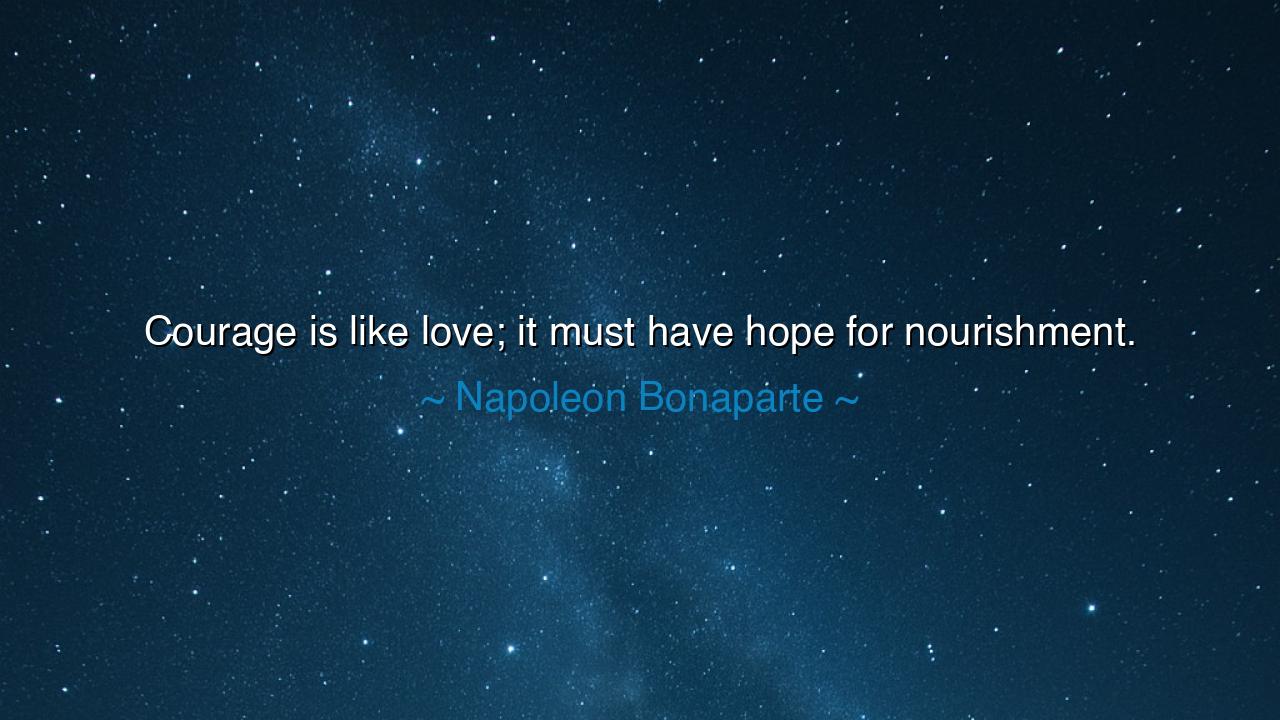
Courage is like love; it must have hope for nourishment.






“Courage is like love; it must have hope for nourishment.” — Napoleon Bonaparte
In these few words, Napoleon Bonaparte, the conqueror of nations and student of the human heart, speaks not merely as a warrior but as a philosopher of the soul. He who had seen men stand firm amidst the roar of cannons knew that courage cannot live on will alone. Like a flame that requires air to burn, courage draws its strength from hope — the belief that one’s struggle is not in vain, that dawn will come after the longest night. Just as love fades when all faith in its future is lost, so too does courage wither when there is no vision of victory, no whisper of meaning in the suffering.
Napoleon, though a man of war, understood deeply the realm of the spirit. He had seen soldiers march into fire for ideals they believed in — liberty, glory, or homeland — and he had seen them falter when that belief was shattered. To act bravely without hope is not valor but despair. Hope is the secret spring that makes the weary rise again, that transforms fear into resolve and endurance into triumph. Without it, even the strongest heart becomes brittle, and the proudest army loses its fire.
Consider the winter of 1812, when Napoleon’s army, once mighty and radiant, struggled through the icy desolation of Russia. The soldiers, half-starved and frostbitten, trudged forward under a sky of deathly silence. Those who still hoped — for home, for victory, for meaning — kept walking. Those whose hope had died lay down upon the snow and never rose again. It was not strength of body that separated the living from the fallen, but the presence or absence of hope. Thus did Napoleon, through suffering and loss, learn that courage cannot be commanded by force — it must be nourished, as one tends the fragile flame of faith.
The ancients too knew this truth. The Spartans at Thermopylae, though doomed, held their courage not because they were fearless, but because they hoped — not in survival, but in the eternal glory of sacrifice. Their hope was not for themselves, but for Greece, for freedom, for a name that would echo through time. And indeed, it does. Hope gives courage its direction, its reason to stand even when reason itself falters. Without hope, courage is a sword with no purpose; with hope, it becomes a light in the darkness.
In love, as in courage, the heart requires belief in tomorrow. Lovers endure hardship because they see a future where joy will bloom again. The soldier fights because he dreams of peace. The reformer resists because he trusts in justice yet unseen. All acts of bravery, all outpourings of love, spring from this same eternal source — hope, the seed of all human greatness. To lose it is to lose the will to strive, to love, to live.
And yet, let it be known: hope is not blind optimism. It is not the denial of danger or despair, but the conviction that beyond them lies something worth enduring for. The ancients likened hope to the morning star — faint, yet unfailing, it shines even before dawn breaks. So must we carry it in our hearts when the world grows cold. For when hope dies, courage starves; when hope endures, courage is fed.
So, my child of destiny, remember this: to be courageous, you must also be hopeful. Feed your heart with visions of the good you seek. When the world weighs heavy upon you, recall why you began your journey. Keep before your mind the image of what your soul longs for — whether it be freedom, love, justice, or peace. Let that image be your nourishment. Hope is the bread of the brave, and without it, no soul can stand against the storm.
Therefore, cultivate hope as you would tend a sacred fire. Protect it from the winds of doubt, feed it with the kindling of faith, and let it warm the cold chambers of your spirit. For in the union of hope and courage, man rises above despair; he becomes as radiant as love itself — unstoppable, unyielding, and immortal in purpose.






AAdministratorAdministrator
Welcome, honored guests. Please leave a comment, we will respond soon